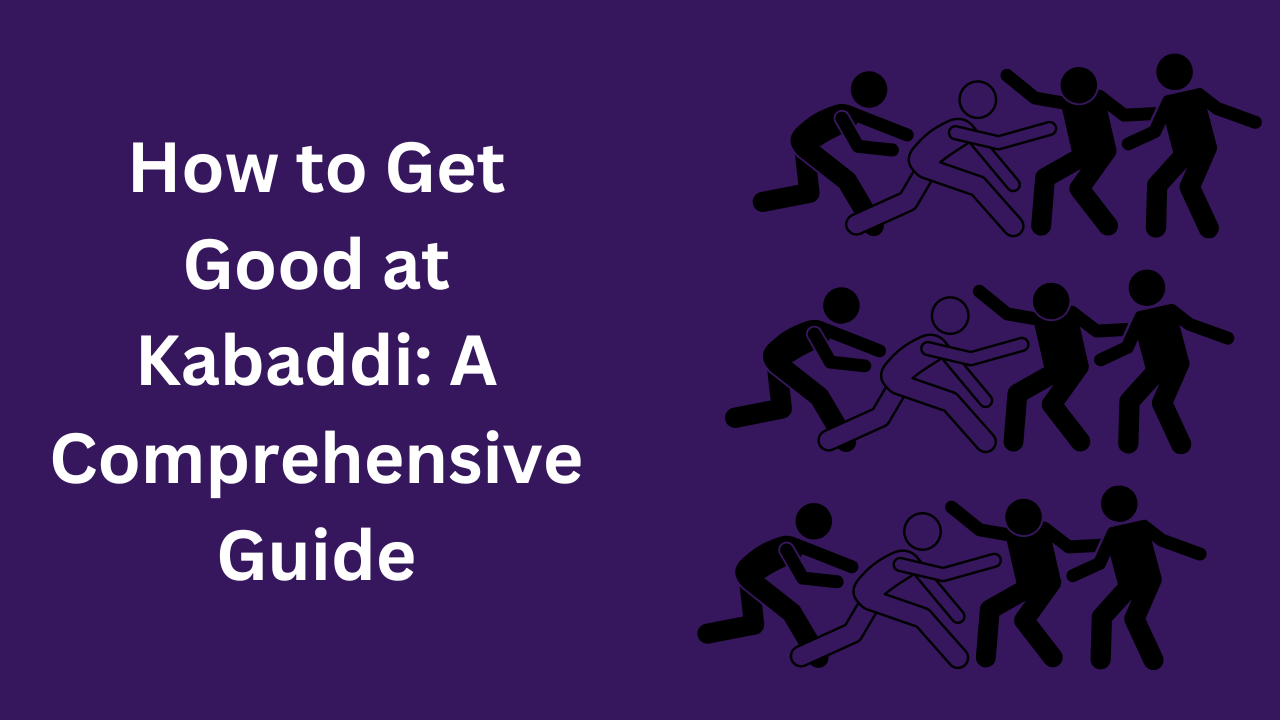Introduction
Due to its distinctive fusion of power, agility, and strategy, the traditional Indian sport of Kabaddi is becoming more and more well-known on a global scale. This tutorial will give you useful tips on how to master Kabaddi, whether you’re a newbie trying to understand the fundamentals or an aspiring pro looking to improve your skills.
How to Get Good at Kabaddi
The Fundamentals of Kabaddi
To become proficient in Kabaddi, you must start with the fundamentals. Understanding the basics will set a strong foundation for your journey to mastery.
1. Regulations and Rules
Start by being familiar with the Kabaddi rules and regulations. This includes understanding how points are scored, the court dimensions, and the roles of each player.
2. Mastering the Raids
Raids are the heart of Kabaddi. Learn various raiding techniques, such as the frog jump and toe touch, to outwit your opponents and score points for your team.
3. Defensive Strategies
Defense is equally crucial. Discover defensive tactics like ankle holds, thigh holds, and waist holds to stop raiders in their tracks.
Physical Conditioning
Kabaddi demands peak physical fitness. To excel, incorporate these aspects into your training routine:
4. Strength Training
Build your strength with exercises like push-ups, squats, and planks. Kabaddi players need robust muscles to execute powerful moves.
5. Speed and Agility
Improve your speed and agility through drills that enhance your footwork, quick direction changes, and reaction time.
6. Endurance
Kabaddi matches can be physically demanding. Boost your endurance with cardio workouts to keep up the pace throughout the game.
Mental Preparation
Success in Kabaddi requires mental resilience and strategic thinking. Work on the following:
7. Focus and Concentration
Enhance your ability to concentrate during high-pressure situations, which is vital for successful raiding and defense.
8. Game Strategy
Study the strategies employed by top Kabaddi players and teams. Adapt and develop your own game plan to stay one step ahead of your opponents.
9. Visualization
Use visualization techniques to mentally rehearse your moves and strategies. This can improve your decision-making on the court.
Learning from the Pros
10. Watch Kabaddi Matches
Watch professional Kabaddi matches to observe advanced techniques, teamwork, and game dynamics.
11. Attend Workshops and Camps
Participate in Kabaddi workshops and training camps led by experienced coaches and players to refine your skills.
Compete and Practice
12. Join a Local Team
Joining a local Kabaddi team is an excellent way to gain practical experience, receive guidance, and compete regularly.
13. Solo Practice
Dedicate time to solo practice sessions, honing your skills in both raiding and defending.
Injury Prevention
14. Warm-Up and Stretching
Always warm up before training or a match, and incorporate stretching exercises to prevent injuries.
15. Rest and Recovery
Allow your body sufficient time to recover between intense training sessions to avoid overexertion.
Nutrition and Hydration
16. Balanced Diet
To fuel your body during Kabaddi, maintain a balanced diet that is high in protein, carbohydrates, and important vitamins and minerals.
17. Hydration
To perform at your best, stay hydrated before, during, and after games and practise.
Equipment and Gear
18. Selecting the Right Gear
Invest in quality Kabaddi shoes, knee pads, and other protective gear to ensure safety and comfort during play.
Injury Management
19. Seek Professional Help
In case of injuries, consult a sports physiotherapist or doctor for proper diagnosis and rehabilitation.
Game Analysis
20. Review Your Matches
Analyze your performance and mistakes from previous matches to identify areas for improvement.
Mental Toughness
21. Overcoming Challenges
Stay resilient in the face of setbacks and losses. Mental strength is a significant asset in Kabaddi.
Building Team Dynamics
22. Communication
Effective communication with your teammates is essential for coordination and strategy execution.
23. Trust and Unity
Foster trust and unity within your team. A cohesive team performs better on the Kabaddi court.
Goal Setting
24. Set Achievable Goals
Establish short-term and long-term goals to track your progress and motivation.
The Future of Kabaddi
25. International Opportunities
Kabaddi is gaining recognition globally. Explore international opportunities to showcase your skills on a larger stage.
FAQs
Q: How can I improve my Kabaddi skills quickly? A: Quick improvement in Kabaddi skills comes through consistent practice, dedication, and learning from experienced players.
Q: What’s the most challenging aspect of Kabaddi? A: Kabaddi’s physical demands and the need for quick decision-making under pressure can be challenging.
Q: Can I play Kabaddi if I’m not exceptionally strong? A: Yes, Kabaddi requires a combination of strength, agility, and strategy, so players with various strengths can excel.
Q: How do I find a local Kabaddi team to join? A: Check local sports clubs, social media groups, or ask at sports facilities to find Kabaddi teams in your area.
Q: Are there age restrictions for playing Kabaddi? A: Kabaddi is suitable for players of all ages, but specific age categories may apply in competitive leagues.
Q: What’s the best way to recover from Kabaddi-related injuries? A: Seek professional medical advice and follow a structured rehabilitation program for a safe recovery.
Conclusion
Mastering Kabaddi is a rewarding journey that combines physical prowess, mental agility, and teamwork. By following the steps and tips outlined in this guide, you can significantly enhance your Kabaddi skills and become a formidable player. So, gear up, step onto the Kabaddi court, and let your journey to excellence begin!
